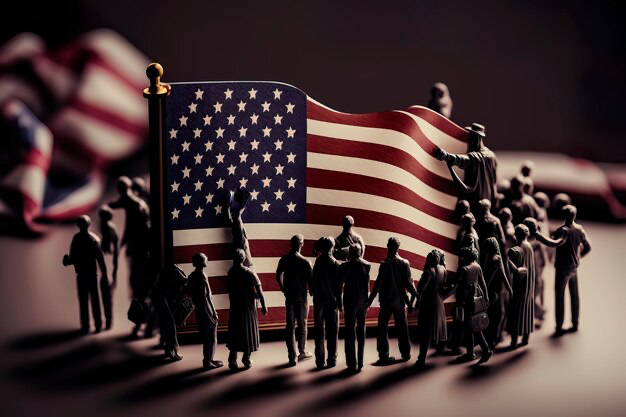The lingering influence of the American Civil War, a monumental event etched in the annals of history, pervades our contemporary society. This intense conflict, which saw approximately 750,000 casualties and a nation torn asunder between its northern and southern regions, is undoubtedly an indelible part of America’s narrative. Being the world’s first major industrialized war, it has inevitably left profound imprints that continue to resonate.
This conflict was not just a remnant of a tumultuous past but also a definitive resolution to several debates that had been simmering since the inception of the United States. Among these debates, the contentious issue of slavery held significant prominence.
With this backdrop, let’s delve into some of the far-reaching transformations catalyzed by the Civil War, which are instrumental in shaping the contours of modern society.
Civil War: The Crucible that Ended Slavery
The Civil War, a profound and tumultuous period in American history, was fueled majorly by the heated debate over slavery. Delve into our comprehensive feature, “The Catalysts Behind the Civil War” to gain further understanding of how this issue galvanized the nation into conflict.
Indeed, the most substantial societal transformation prompted by the Civil War was the eradication of slavery, a deep-rooted institution that had long threatened the unity and moral fabric of the nation.
The intense conflict had been raging for two years when a landmark moment arrived on January 1, 1863. President Lincoln proclaimed the Emancipation Declaration, which announced the liberation of all enslaved individuals in the Confederacy. Although it did not render immediate freedom to all enslaved people across United States, it marked a significant stride towards the ultimate goal.
The true death blow to slavery was dealt with the ratification of the Thirteenth Amendment on January 31, 1865. This historic amendment consecrated the abolition of slavery across the United States, finally extinguishing an institution that had once cast a dark shadow over the nation’s existence.
Thus, the Civil War transformed the social landscape of America, permanently severing the chains of slavery that had bound millions and placing the nation on the path towards equality and justice.
Civil War: The Epoch that Strengthened the Press
The freedom of expression, encompassing political perspectives and the critique of government authorities, is a cornerstone of American society. This right is crucial in the democratic framework of America as it enables citizens to hold their government accountable by expressing concerns about leadership. It also stimulates critical thinking about societal developments, thus empowering individuals to contribute to societal betterment.
During the Civil War, public discourse faced numerous restrictions. Detractors argued against these curtailments, considering them as unfair impingements on constitutional liberties. Nevertheless, the federal government deemed these restrictions necessary for the ‘greater good.’ Fears of revealing sensitive information, like military strategies, or the propagation of harmful propaganda, prompted Union generals to regulate press publications.
Interestingly, in the concluding days of the war, Confederate soldiers found it necessary to turn to newspapers for updates. It was because their generals refrained from disclosing information about Confederate losses to avoid morale deterioration.
In this light, the Civil War marked a decisive turning point for American press. It could be argued as the advent of the ‘continuous news cycles’ that we are familiar with today. With an audience hungry for updates, newspapers provided a steady stream of war coverage, the scale of which was unprecedented.
This increase in the press’s prominence persisted beyond the war and led to a revitalized print media with a profound influence on national politics and public opinion. It established the press as not just a chronicler of events, but a formidable force capable of shaping the narrative and steering national discourse.

A Revolutionary Surge: Women’s Rights and the Civil War
An undeniable turning point in women’s rights history, the Civil War, witnessed increasing participation from women. The conflict brought about profound societal changes, and women found themselves at the center of many of these shifts.
With the ever-growing list of men heading for the frontlines, women began to step into roles previously dominated by their male counterparts. They assumed responsibilities in fields like farming and manual labor, thereby challenging the boundaries of traditional gender roles.
In addition, the war also saw the rise of women-led societies committed to supporting soldiers. These groups undertook tasks such as preparing food, creating uniforms, and campaigning for improved conditions for soldiers.
An interesting aspect of this time was the incorporation of women into the nursing profession. Over 20,000 women enlisted as nurses, with noteworthy figures like Clara Barton making their mark. Barton was instrumental in bringing the Red Cross to America in 1881, further solidifying her influence and the growing prominence of women in society.
Furthermore, women were not just limited to supportive roles but also actively participated in the conflict. Several women took up arms, disguised as men, or operated as spies. While the exact number remains unknown, it is estimated that up to 1,000 women participated in the fighting.
The Civil War era also saw a surge in women’s political activism. In the post-war reconstruction phase, women started exercising their right to vote. In 1869, an amendment prohibiting states from restricting women’s voting rights was passed by Congress, marking a significant stride towards gender equality. While it took two decades for all 45 states to ratify it, this amendment was pivotal in shaping women’s political engagement in the United States.
Conclusion
In essence, the Civil War was not merely a chapter in American history, but a transformative force that redefined societal norms and laid the groundwork for the nation’s future. This pivotal period shaped economic structures, challenged societal practices, and gave impetus to movements such as women’s rights, leaving an indelible mark on the American social fabric. With the echoes of this impactful era still resonating in contemporary America, understanding its profound influence is instrumental in deciphering the complex narrative of our evolving society.
